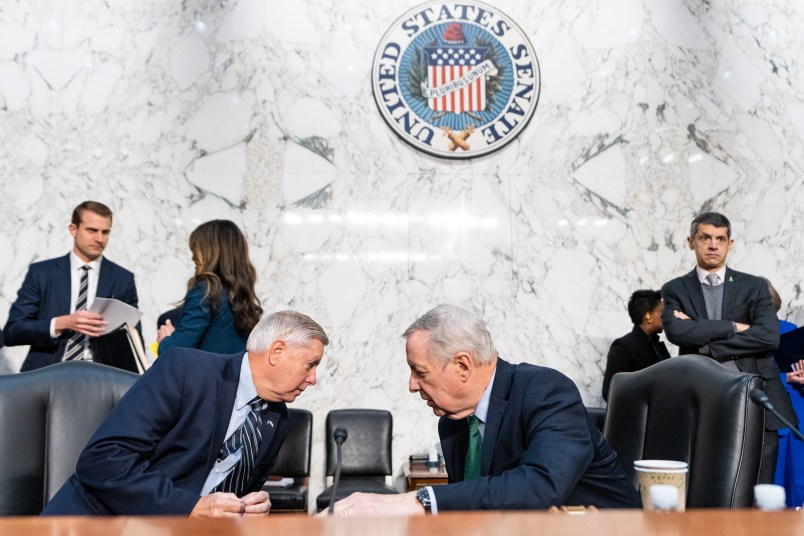Senate Judiciary Committee Chair Dick Durbin (D-IL) confirmed Thursday that the committee will vote next week to authorize subpoenas for a few powerful right-wing players known to have intimate, monetary relationships with Supreme Court justices.
The committee plans to authorize subpoenas next Thursday for Federalist Society founder Leonard Leo and mega-donors Harlan Crow and Robin Arkley II. The vote will almost certainly come down along party lines, as Senate Judiciary Republicans railed against the plan during a Thursday business meeting.
“We’ll have a bunch of subpoenas to answer your subpoenas,” Ranking Member Lindsey Graham (R-SC) promised, adding that: “You know you’re not gonna get 60 votes to enforce the subpoena.”
Graham is referring to a few steps ahead in the process where, hypothetically, Senate Judiciary Democrats authorize the subpoenas, Durbin sends them out, the three subjects summarily ignore the calls to come before the committee and Durbin has to go to the floor for a full Senate vote to enforce the subpoenas. That vote would be subject to the Senate filibuster, meaning that several Republicans would have to join with the Democrats.
Based on their rancor Thursday morning — “It’s not, as Senator Whitehouse says, an effort to expose wrongdoing in the Supreme Court, it’s an effort to delegitimize the Supreme Court because you don’t like the way they rule,” Sen. Tom Cotton (R-AR) said — Republicans seem unlikely to cooperate.
Such a filibuster of enforcing a committee subpoena would be unprecedented, per Bloomberg Law, and would set an example Senate Democrats could take advantage of whenever they’re stuck back in the minority. But most on the committee didn’t express much optimism that their subpoenas would survive the GOP gauntlet.
“The billionaires who are behind the court capture scheme are the same billionaires who fund the Republicans’ super PACs,” Sen. Sheldon Whitehouse (D-RI) told TPM. “So I think there’s a high level of performance taking place.”
“Leonard Leo has a protection squad,” Sen. Peter Welch (D-VT) added through a mouthful of crackers as he left the Senate Democrats’ lunch.
If Republicans make good on the threat, it’ll be much more difficult for the Senate Judiciary Committee to haul the three before it. Durbin would likely have to ask the Justice Department to go after any of the three for contempt, if they ignored the subpoenas — a more time consuming endeavor, and DOJ could turn down the request.
“To the best of my knowledge, no,” Sen. Chris Coons (D-DE) said when TPM asked if the committee had other mechanisms to force the men to testify.
Durbin didn’t directly answer TPM’s question about further recourse, instead lamenting: “Ethics used to be a bipartisan topic, but this morning, it became very partisan.”
Still, court reformers cheered that Senate Democrats are finally at least trying to use their subpoena power, putting the onus on Republicans to go on record blocking them amid a steady trickle of Supreme Court corruption stories.
“These subpoenas are an essential investigative tool of the Senate, and the Judiciary Committee is appropriately fulfilling its oversight role at a time of mounting evidence of partisan corruption and lawbreaking by justices on the nation’s highest court,” Alex Aronson, former Whitehouse general counsel and current executive director at Court Accountability, told TPM.
He added that “judging by their histrionics today,” “Senate Republicans have made clear they’re willing to cede their own institutional authority to allow this corrupt abuse of judicial power to continue.”
The House, of course, is not encumbered by the filibuster, a reality which could cut both ways. For one, if Senate Republicans are serious about issuing retributive subpoenas, they could outsource that effort to their House counterparts in a chamber where Democrats have no machinery to kill their enforcement.
It also layers even more importance onto the banner 2024 election. Should Democrats win back the House then, they could do real Supreme Court oversight, unencumbered by either the filibuster or by institutionalist Senate leadership some Democrats and advocates have quietly grumbled are too meek to meet the moment.



